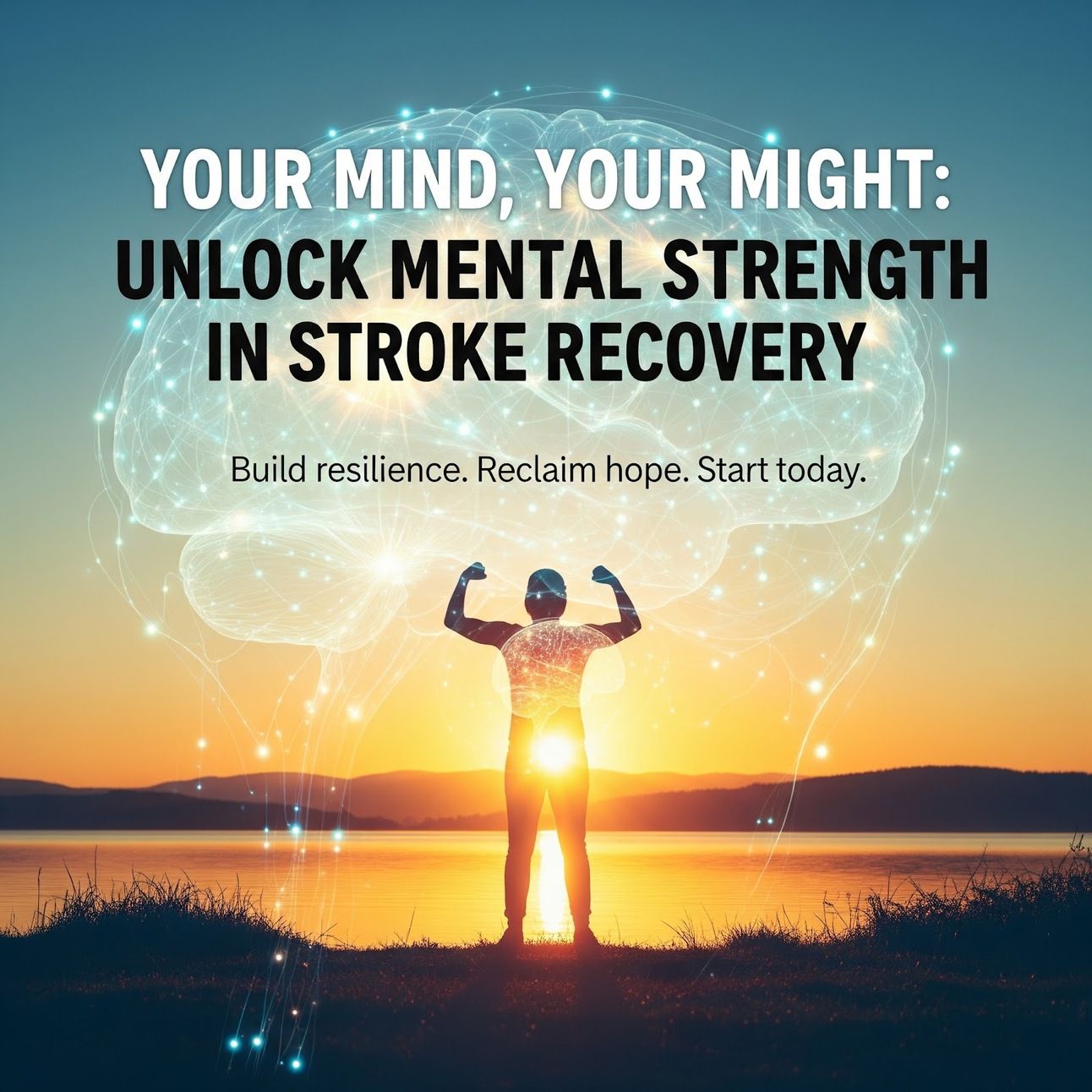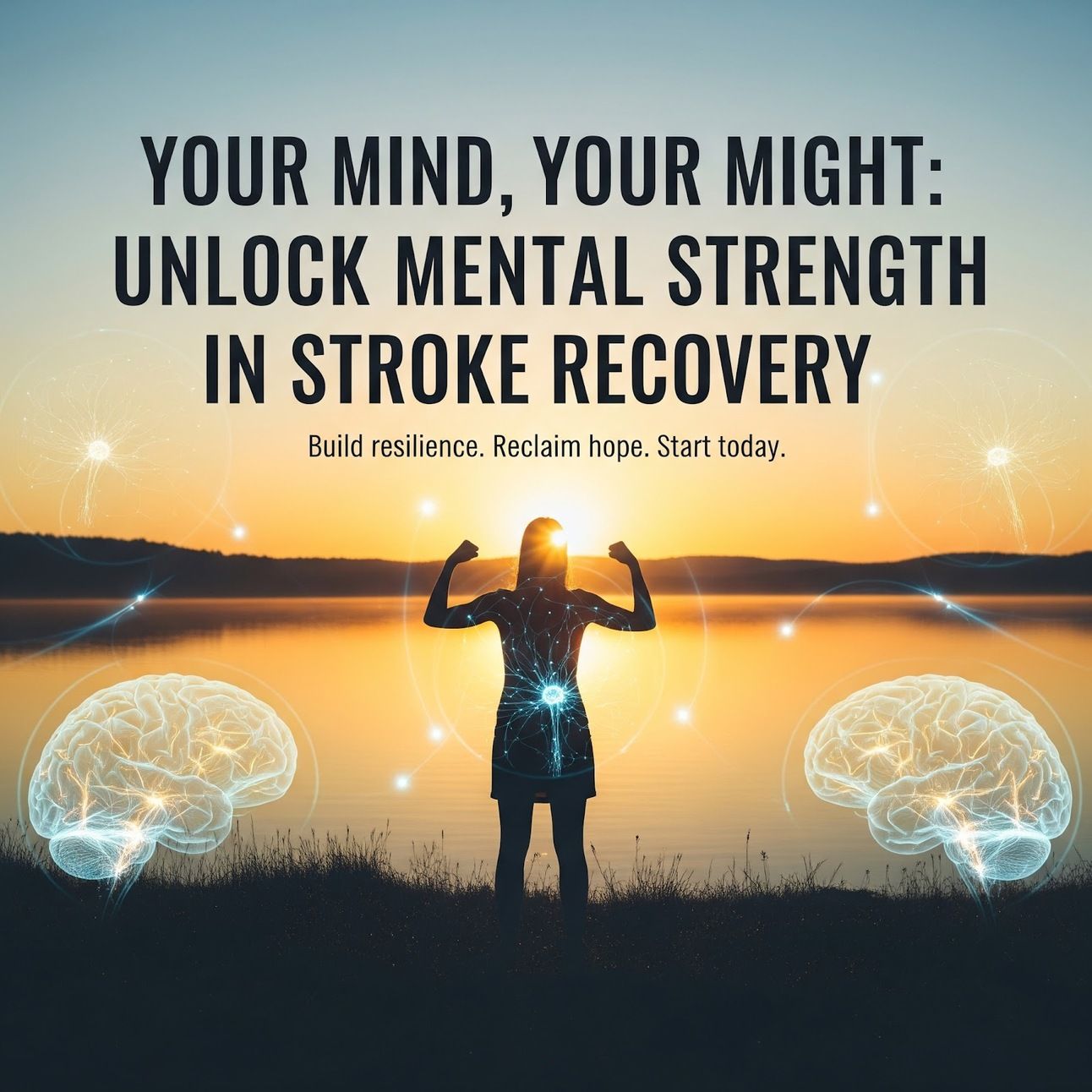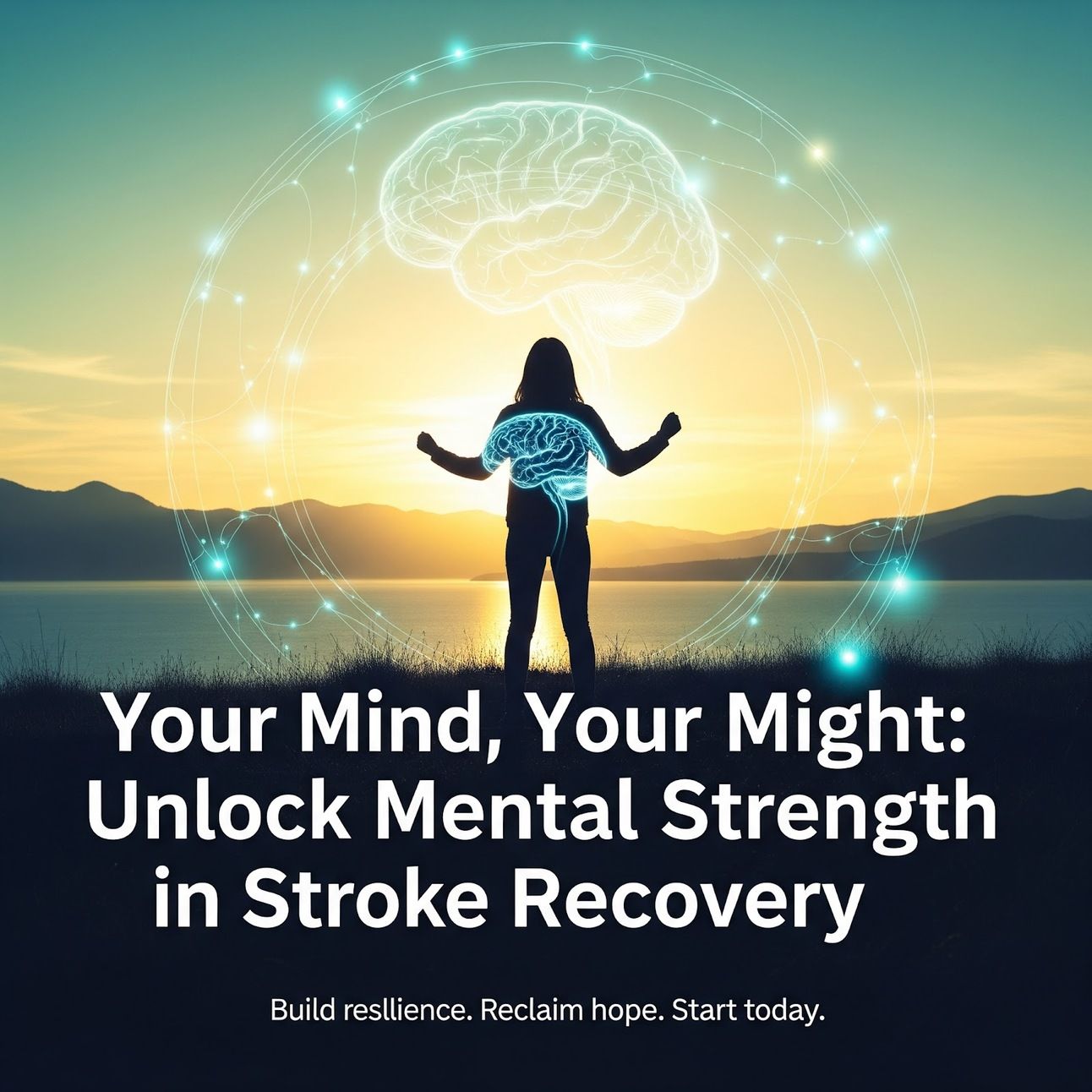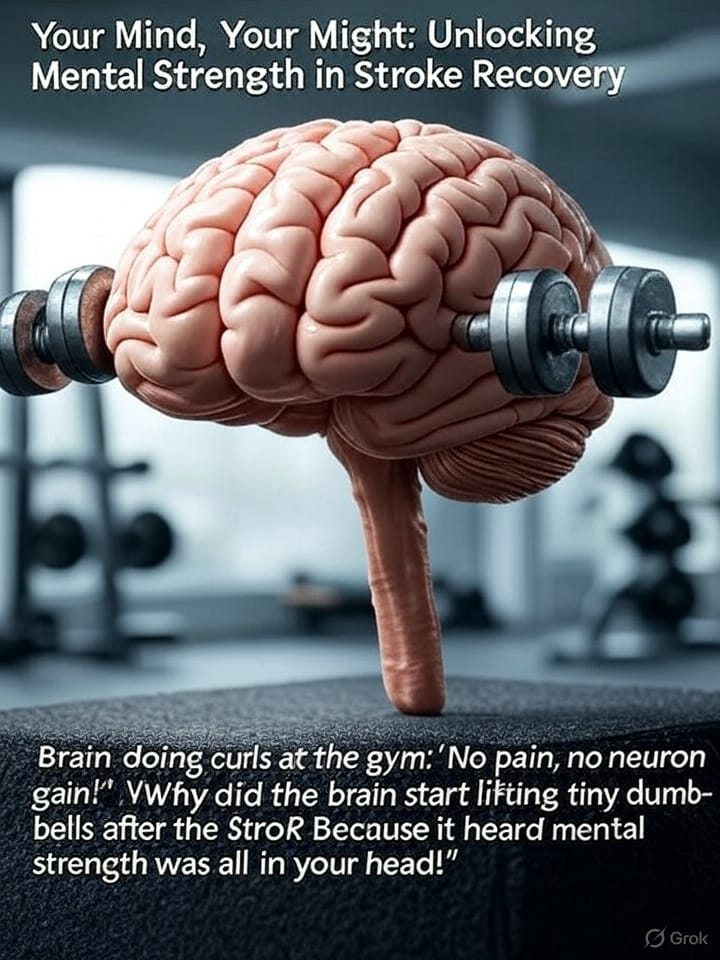- Chuck's Stroke Warriors Newsletter
- Posts
- Issue #104: Mind Over Stroke - Build Strength for Your Comeback
Issue #104: Mind Over Stroke - Build Strength for Your Comeback
Tap Into Your Mind to Power Your Recovery
Scared You’ll Never Feel Strong After a Stroke?
Stroke recovery isn’t just physical—it’s a mental battle too. You want to feel strong, but fear and frustration take over. Will you ever regain your independence? The uncertainty is overwhelming.
It hurts to feel like you’re losing yourself. Every slow day or small setback makes you question if you’re strong enough. Thoughts like “What if I can’t do this?” or “What if another stroke happens?” keep you up at night. Without mental strength, recovery feels like a fight you’re not sure you can win. You’re tired of feeling scared and stuck—you want to feel hopeful again.
Your Mind, Your Might: Unlocking Mental Strength in Stroke Recovery is your roadmap to a stronger mindset. You don’t need to be perfect—just persistent. Simple habits like writing down three daily wins or practicing deep breathing can shift your perspective. You’ll learn to silence negative thoughts and build resilience, one small step at a time. Your comeback story starts in your mind, and you’re more powerful than you realize. Let’s start building that strength today.
👉 Read this week’s newsletter to get expert advice and real-life strategies that work.
👉 Don’t miss a single issue—subscribe now and join a community that supports your journey!
Updates and Recent Developments in Stroke Recovery

Your Mind, Your Might: Unlocking Mental Strength in Stroke Recovery
Your Mind, Your Might: Unlocking Mental Strength in Stroke Recovery
The Power of Mental Strength After Stroke
Recovering from a stroke isn’t just about physical healing—it’s a journey of the mind, too. Many survivors face emotional ups and downs, from frustration and sadness to moments of hope and determination. Building your mental strength can make a real difference in how you feel day to day and how you move forward in your recovery.
What Recent Research Tells Us
Recent studies show that mental health is just as important as physical rehab after a stroke. About 30% of stroke survivors experience depression, which can slow recovery and increase the risk of another stroke. But there’s good news: focusing on your mental well-being can help you bounce back stronger[1][2].
Key factors that boost mental strength include:
Self-efficacy: Believing in your ability to handle challenges.
Social support: Connecting with family, friends, and support groups.
Positive coping skills: Finding healthy ways to manage stress, like mindfulness or gentle movement.
Setting meaningful goals: Focusing on what matters most to you[2][3][4].
One recent pilot program found that practicing mindfulness—paying attention to the present moment without judgment—helped stroke survivors feel more resilient and supported. Participants said it made a big difference in their outlook and recovery process[4].
Actionable Tips for Building Mental Strength
Try simple brain exercises: Puzzles, memory games, and even counting coins can help sharpen your mind[5][6].
Practice positive self-talk: Replace “I can’t” with “I will try.” Small changes in language can boost confidence[2].
Join a support group: Sharing your journey with others who understand can reduce feelings of isolation and increase motivation[2].
Take care of your emotional health: Don’t hesitate to talk to a counselor or therapist if you’re feeling overwhelmed or down[1][3].
Curated Resources for Your Recovery
American Stroke Association: Steps to Mental and Physical Recovery
Offers practical advice on positive thinking, goal setting, and support[2].
Flint Rehab: Cognitive Exercises for Stroke Patients
Lists fun and easy brain exercises to try at home[5].
AfterStroke: The Power of Resilience in Stroke Recovery
Explains how to build emotional resilience and find support[7].
Mindfulness-Based Recovery from Stroke (Recent Study)
Shows how mindfulness can help boost resilience and quality of life[4].
Remember, your mind is a powerful part of your recovery. Every small step you take to care for your mental health is a step toward greater strength and independence.
[6] https://www.healthline.com/health/stroke-treatment-and-timing/brain-exercises-for-stroke-recovery
[11] https://thestrokefoundation.org/managing-stress-after-stroke-rest-recovery-and-emotional-resilience/
[17] https://www.pantai.com.my/medical-specialties/neurology/stroke-recovery-brain-exercise [18] https://www.mayoclinic.org/diseases-conditions/stroke/in-depth/stroke-rehabilitation/art-20045172
Thoughts and Insights:

Issue #104: Mind Over Stroke - Build Strength for Your Comeback
Your Mind, Your Might: Unlocking Mental Strength in Recovery—The Comeback Story You Were Born to Write
Introduction
Let’s face it—recovery, whether from a stroke, surgery, trauma, or emotional burnout, isn’t just about physical healing. It’s a full-body, full-heart, full-mind experience. And yet, most people focus on the physical stuff and overlook the game-changer: your mental strength.
Welcome to Your Mind, Your Might: Unlocking Mental Strength in Recovery—a no-fluff, human-first guide to help you flip the switch in your brain and supercharge your healing journey. Think of this as a pep talk meets a survival guide meets a blueprint for the comeback of the century (yours).
If you’ve ever wondered, “How do I stay motivated when every step feels like a marathon?” or “How do I bounce back when my spirit feels crushed?”—you’re in the right place. Let’s dive in.
🧠 What Is Mental Strength, Anyway?
Before we get all fired up, let’s define our terms. Mental strength isn’t about being emotionless or powering through pain like a machine. Nope. It's about this:
Resilience in the face of setbacks
Self-belief when nobody’s cheering
Emotional flexibility (aka, not falling apart over every little thing)
The ability to set goals—and stick with them
Staying grounded, even when life goes sideways
Sound like something you want more of? Yeah, us too.
🔥 Why “Your Mind, Your Might” Matters More Than You Think
You could have the best doctors, the strongest meds, or the most supportive family—but without engaging your mind, recovery turns into a slog. The phrase Your Mind, Your Might: Unlocking Mental Strength in Recovery isn't just catchy—it's a truth bomb.
Here's why this mindset matters:
Mental strength fuels motivation. When your body's down, your brain steps up.
Your thoughts shape your reality. Negative self-talk? That’ll stall you. Positive reframing? That’ll push you forward.
Confidence affects outcomes. Studies show belief in recovery can literally change recovery.
💡 Mind Over Matter: Real Talk from the Recovery Road
Let’s get real. Recovery sucks sometimes. It's painful. It's slow. It's lonely. But here's the thing:
You don’t have to be perfect. You just have to be persistent.
Common Mental Blocks People Face in Recovery:
Imposter Syndrome – “Am I really getting better or just faking it?”
Comparison Trap – “Why is everyone else further along?”
Fear of Regression – “What if I lose everything I’ve gained?”
Lack of Motivation – “I don’t feel like trying today.”
Been there? Good. That means you’re human. But guess what—there are ways through it.
🛠️ Tools to Unlock Mental Strength
Alright, so how do we actually do this whole “unlock your mind” thing?
Reframe the Narrative
Stop calling yourself “broken” or “behind.” Start saying:
“I’m rebuilding.”
“I’m on a path—my path.”
“I am learning strength I never knew I had.”
Words matter. So speak like someone worth rooting for (because you are).
Create a Mental Fitness Routine
We do push-ups for our bodies. Time to work out that brain.
Gratitude journaling – Write 3 wins a day (even if one is “I brushed my teeth”).
Guided meditations – Apps like Calm or Headspace are gold.
Visualization – Picture yourself walking confidently, speaking clearly, living boldly.
Affirmations – Try: “My mind is stronger than my doubts.”
Lean into Micro-Wins
Forget giant goals for a sec. Focus on bite-sized wins:
Did you show up to therapy?
Did you stretch even when you didn’t feel like it?
Did you smile at yourself in the mirror?
Celebrate them all. Micro-wins become mega-momentum.
💬 Frequently Asked Questions
Q: What if I just don’t feel mentally strong right now?
A: That’s okay. Mental strength isn’t a switch—it’s a skill. Like any muscle, it gets stronger with practice. Start where you are.
Q: Can I still feel sad, scared, or angry and be mentally strong?
A: Absolutely! Mental strength includes honoring your feelings, not hiding them. It’s what you do next that builds strength.
Q: What if my recovery isn’t going “fast enough”?
A: Progress isn’t a race. Your timeline is your own. Forward is forward.
💬 Real Talk: Mental Strength in the Face of Setbacks
Let’s say you were doing great—and then, BAM. A bad day. A fall. A hospital trip. It feels like starting over, right?
But here’s a truth you need to tattoo on your soul:
Setbacks aren’t stop signs. They’re speed bumps.
When you hit a wall:
Pause. Don’t panic.
Breathe. Cry if you have to.
Then—reboot.
You’ve come too far to quit now.
💖 Emotional Fuel: The Role of Hope and Humor
Don't underestimate the power of a good laugh and a hopeful heart. In dark times, hope is your flashlight—and humor is your backup generator.
Watch comedies. Read feel-good stories. Make dumb jokes. Hope and humor help release tension, lower stress hormones, and remind you that you’re still you—not just a diagnosis or a patient.
✨ Recovery Isn’t a Solo Mission
Even the strongest minds need support. Whether it’s a caregiver, a fellow survivor, a faith group, or an online community—connection is your secret weapon.
People to keep in your corner:
A good therapist or counselor
A buddy who “gets it”
Encouraging voices (books, podcasts, support groups)
A cheerleader (friend, spouse, pet—hey, pets count!)
Surround yourself with voices that say, “You’ve got this.”
📘 Bonus: 5 Daily Mental Strength Habits to Try Today
Morning mantra: Start with, “Today I choose progress, not perfection.”
One-minute grounding: Breathe in for 4, hold for 4, exhale for 4.
Limit doom-scrolling: Replace 10 minutes of scrolling with 10 minutes of journaling.
Celebrate one small win: Literally say out loud, “That was awesome.”
End-of-day reflection: Ask, “What did I learn about myself today?”
🧩 Putting It All Together: Your Recovery, Rewritten
Let’s recap what Your Mind, Your Might: Unlocking Mental Strength in Recovery is all about:
You have more control over your mindset than you think.
Mental strength isn’t about pretending to be okay. It’s about continuing even when you’re not.
Every small step forward counts.
You’re not alone, and you never have to “tough it out” in silence.
The mind is your battlefield—but also your biggest ally. What you say to yourself, believe about yourself, and expect from yourself can change everything.
If there’s one thing you take away from this, let it be this:
You are not your injury. You are not your diagnosis. You are not stuck.
You are becoming. Healing. Rising.
Recovery is messy, but so is every great story. And the greatest stories? They always include a hero who falls... and gets back up.
That hero? That’s you.
So say it out loud with me:
“Your Mind, Your Might: Unlocking Mental Strength in Recovery” is my new mantra. I’ve got this. I’m just getting started.”
And you are.

Your Mind, Your Might: Unlocking Mental Strength in Stroke Recovery
Your Mind, Your Might: Unlocking Mental Strength in Stroke Recovery
Recovering from a stroke isn’t just about the body—it’s also about the heart and the mind. Your Mind, Your Might: Unlocking Mental Strength in Stroke Recovery is more than a phrase; it’s a mindset shift. This guide is designed for stroke survivors who want practical, compassionate support for their journey.
💛 Emotional Coping Strategies
Recovery isn’t just physical—it’s emotional. Many survivors feel overwhelmed, frustrated, or alone. That’s normal. But you don’t have to stay stuck in that place.
🌤 1. Embrace the Power of Small Wins
You might not run a marathon tomorrow—but getting out of bed, taking a shower, or speaking a full sentence are victories. Try this:
Keep a daily win journal
Celebrate every tiny step forward
🧭 2. Reframe Setbacks as Lessons
Plateaus and tough days happen. Instead of seeing them as failure, look at them as part of the process. Example: “I couldn’t walk as far today—but I showed up. That counts.” Mental strength means showing up, not being perfect.
🧑🤝🧑 3. Connect With Fellow Survivors
Isolation is common, but connection heals. Join:
Online stroke recovery groups (Facebook, Reddit)
Local survivor meetups or support groups Talking to someone who gets it is powerful medicine.
🧘 4. Practice “Brain Breaks”
Recovery is hard work, mentally and physically. Rest matters too. Try:
Guided meditation apps like Insight Timer
Listening to calming music
Sitting outside for 5 minutes and noticing what you see, hear, or feel These mini-breaks reset your nervous system and help recharge your mind.
💬 5. Speak Kindly to Yourself
Your inner voice can either lift you up or drag you down. Swap out:
“I’m useless” → “I’m healing, and that takes time.”
“I should be better by now” → “Progress looks different every day.” Talk to yourself like you would talk to a friend in your shoes.
🌱 Final Thoughts: You’re Stronger Than You Know
Your Mind, Your Might: Unlocking Mental Strength in Stroke Recovery isn’t about pushing harder—it’s about finding your rhythm, honoring your journey, and believing in your comeback story. The tools and emotional strategies here are just the beginning. You’ve already done one of the bravest things—facing life after a stroke. Keep going. You’re not alone, and your recovery is worth every effort.
If you need a reminder:
Progress takes time
You’re doing better than you think
Every step forward—no matter how small—matters
Stay strong. Stay curious. And never stop believing in the power of your mind, your might.
Silly Humor

Your Mind, Your Might: Unlocking Mental Strength in Stroke Recover
🧠 Your Mind, Your Might: Unlocking Mental Strength in Stroke Recovery 🧠
Dad Joke: Why did the brain start lifting tiny dumbbells after the stroke? Because it heard mental strength was all in your head!
Anecdote: Last week, Joe tried to do a crossword puzzle to “work his brain muscles.” After solving three clues and accidentally eating the eraser, he said, “Well, at least my taste in puzzles is improving.” His wife laughed, handed him a pen, and said, “One word at a time, champ.”
Cartoon Caption Idea: “Brain doing curls at the gym: ‘No pain, no neuron gain!’”
Encouragement: Keep flexing that mind of yours—your strength isn't just in your muscles, it's in every brave thought you think. You're doing amazing! 💪🧠

Why Psychological Resilience Matters in Long-Term Stroke Rehabilitation
Why Psychological Resilience Matters in Long-Term Stroke Rehabilitation
The Role of Resilience in Recovery
Psychological resilience is your ability to adapt and “bounce back” after a major life event like a stroke. For stroke survivors, this mental strength isn’t just helpful—it’s crucial for long-term rehabilitation.
Better Emotional Health: Resilience helps you manage stress, anxiety, and depression, which are common after a stroke. Survivors with higher resilience tend to experience fewer emotional struggles and are less likely to develop depression or anxiety[5][7].
Improved Cognitive Outcomes: Studies show that resilience is linked to better memory, thinking, and communication skills after stroke. It can also help you stay engaged in daily life and social activities, which supports brain health[4][5].
Higher Quality of Life: Resilient survivors report a better overall quality of life. They’re more likely to accept their condition, adapt to new challenges, and actively participate in rehab, leading to more independence and satisfaction[4][7].
Protective Against Setbacks: Resilience acts as a buffer against the negative effects of stress. It can limit how much stress impacts your recovery, helping you stay focused and motivated even when progress feels slow or setbacks happen[5][7].
Supports Self-Management: Survivors with strong resilience are more likely to stick with self-care routines and rehab exercises, which are key for long-term improvement[1].
Why It’s Crucial for the Long Haul
Recovery from stroke is rarely a straight line. There are ups and downs—physical, emotional, and mental. Resilience helps you keep going through tough times, adjust your mindset, and find new ways to move forward. It also helps you connect with others, ask for help when needed, and celebrate small wins along the way[6][7].
Building resilience isn’t about ignoring challenges—it’s about learning to face them with hope, flexibility, and support. That’s why nurturing your psychological resilience is just as important as physical therapy in your stroke journey.
AI-Generated Writing and Art

Meet Luke the Stroke Warrior, a retired engineer who discovers that sometimes the most powerful comeback happens not with your hands, but with your voice—and a little help from technology that turns his daily struggles into digital love letters to his devoted wife, Abby.
The Text Message Breakthrough
The phone felt heavier than it should in Luke's trembling hand. His right thumb hovered over the keyboard like a nervous butterfly, afraid to land. Three simple words—"I love you"—the same message he'd sent Abby every morning for thirty-seven years. Now, six months post-stroke, those words emerged as digital gibberish: "I kive ypu."
Heat flushed his cheeks. A retired engineer who'd once debugged million-dollar systems couldn't manage a basic text message.
"Dammit!" The word cracked through their quiet kitchen as he jabbed the delete button for the fourth time.
Abby's bare feet whispered across the hardwood floor. She appeared in the doorway, steam rising from her favorite mug—the one with the faded "World's Best Engineer's Wife" inscription he'd given her decades ago.
"What's eating at you, honey?"
Luke's jaw clenched. "My brain knows what I want to say, but my fingers..." He waggled his slightly weakened digits. "They're speaking a different language."
Abby settled beside him on their kitchen bench, the same spot where they'd shared morning coffee for twenty years. She set down her mug and covered his hand with hers. "Talk to me, Luke."
"I wanted to send you a good morning text. Like before." His voice cracked on the last word. "Something so simple, and I can't even—"
"Hey." Abby's thumb traced gentle circles on his knuckles. "Remember what you always told your junior engineers? Every system has multiple input methods."
Luke's engineering brain flickered to life. "When the primary interface fails, you find an alternative pathway."
"Exactly. So what would my brilliant problem-solver do?"
Luke studied his phone with fresh eyes, his programmer's instincts awakening. "I'd... I'd look for another input method." His fingers—steadier now—navigated to settings. "Voice-to-text. Of course."
"Show me what you've got, Mr. Engineer."
Luke held down the microphone button, his voice clear and strong: "Testing, testing. This is Luke the Stroke Warrior, and I'm building my comeback one word at a time."
The words materialized perfectly on screen. Luke's eyes widened like a kid seeing his first magic trick.
"Holy cow, it actually worked!"
"Mind over stroke, baby!" Abby laughed, planting a kiss on his cheek that tasted like coffee and hope.
What started as a simple workaround became Luke's obsession. Over the following weeks, he transformed into a voice-to-text virtuoso, sending Abby messages that made her phone buzz with digital love notes:
"Good morning, gorgeous. Your coffee smells like heaven, and you look like the angel who saved my life."
"System status update: Rehab session tough but manageable. Error code resolved: Missing your smile. Solution: Thinking of you. Love, Luke 2.0."
"Evening log: Today I remembered I'm not broken, just running on new software. Thank you for being my favorite feature."
Abby treasured each message, her heart swelling with every notification. During their daughter Sarah's weekly visit, she showed off the latest gem.
"Dad's becoming quite the digital poet," Sarah laughed, reading aloud: "Roses are red, violets are blue, voice-to-text is awesome, and so are you."
But Luke's real breakthrough came during a grueling physical therapy session. His left arm refused to cooperate, each attempted movement ending in trembling failure. Frustration mounted like pressure in a faulty valve.
"I can't do this anymore," he gasped, slumping in his chair.
Without a word, Abby handed him his phone. "Tell me about it."
Luke activated voice-to-text and let his thoughts flow: "Some days feel impossible. My body doesn't listen to my commands. But then I remember—I'm not the same Luke who had the stroke. I'm Luke 2.0, learning new ways to love, communicate, and live. Every small victory is actually a huge win. Every word I speak is rebuilding my neural pathways. I'm not just recovering—I'm upgrading."
Reading his own words, Luke felt something click into place, like a circuit finally completing its connection. "You know what, Abby? I just gave myself a pep talk."
"And it was beautiful," she whispered, tears sparkling in her eyes.
Luke discovered that voice-to-text wasn't just about communication—it was about reconstruction. He started a voice journal, documenting his recovery journey. Each entry became a testament to his determination, a digital monument to resilience.
Three months later, Luke surprised Abby with a special message: "My dearest Abby, technology brought us together in a new way, but love has always been our strongest connection. Thank you for believing in Luke 2.0. Ready for our next adventure? PS: I typed this with my fingers. Your patient teaching worked!"
Abby looked up from her phone to find Luke grinning, his thumbs dancing more confidently across the keyboard.
"Mind over stroke," she whispered, pulling him close.
"Mind over stroke," Luke agreed, already composing their next digital love letter.
That's it for this week's newsletter, dear Stroke Warriors! Keep in mind,life doesn't stop after a stroke – it's an opportunity to embrace new experiences. Remember, you are not alone on this journey, you are strong, and together, we can overcome any challenge.. Embrace your rehabilitation with determination, and know that progress is within reach.
Disclaimers
Disclaimer:
The information provided in this newsletter is for general informational purposes only and is not intended to constitute professional advice.
Medical Disclaimer:
The content shared in this newsletter is not intended to be a substitute for professional medical advice.
Accuracy Disclaimer:
While we make every effort to provide accurate and up-to-date information, the content in this newsletter may contain errors, omissions, or inaccuracies.
We hope you found the information valuable and informative.
With the assistance of AI, I am able to enhance my writing capabilities and produce more refined content.
This newsletter is a work of creative AI, striving for the perfect blend of perplexity and burstiness. Enjoy!
🌟 Exciting News 🌟
We're thrilled to share that Chuck's journey doesn't stop here. If you're curious about the fascinating world of ChatGPT and artificial intelligence and AI's potential for learning and growth, be sure to check out our sister newsletter, "Chuck Learning ChatGPT"! Discover how Chuck is diving into the realms of AI, exploring innovative ideas, and sharing insights that could inspire new perspectives. To join Chuck on this exciting AI adventure, subscribe to "Chuck Learning ChatGPT:
📡 You’re bored of basic binge content.
🔍 Stories feel scripted—no mystery, no challenge.
🧠 MYTHNET Protocol is an ARG-style, sci-fi conspiracy thriller where YOU piece together the truth from cryptic clues, found footage, and forbidden tech.
✅ Hit play. Decode the myth. Join the protocol. Escape the ordinary.
🎥 Subscribe now.
Channel URL: https://www.youtube.com/@MYTHNET_Protocol
Stay curious, stay inspired, and keep embracing new possibilities with us\!
As always, if you have any feedback or suggestions, please don't hesitate to reach out to us. If you have a experience that you would like to share you can reach out to us here :
Keep an eye out for our next edition, where we will be sharing inspiring stories of triumph and resilience from our community.
Join the Journey of Hope: Subscribe to our free newsletter and be part of the incredible journey of hope as we share inspiring stories of stroke Warriors like Luke and their triumphs over adversity. Receive exclusive content and valuable insights into stroke recovery and caregiving, all delivered straight to your inbox.Issue #102: Life After Stroke - The Truth Nobody Talks About
Share the newsletter on your Social Media\!
Join us in supporting the Chucks Stroke Warriors community with a newsletter sponsorship. Reach a targeted audience and promote your brand. Limited sponsorships are available, contact us for more information at:
Until next time!
Keep fighting and stay resilient!
With warm regards,
Chuck and the Stroke Warrior Team
P.S. If you missed last week's newsletter on “ Issue #102: Life After Stroke - The Truth Nobody Talks About” you can catch up here:
Reply